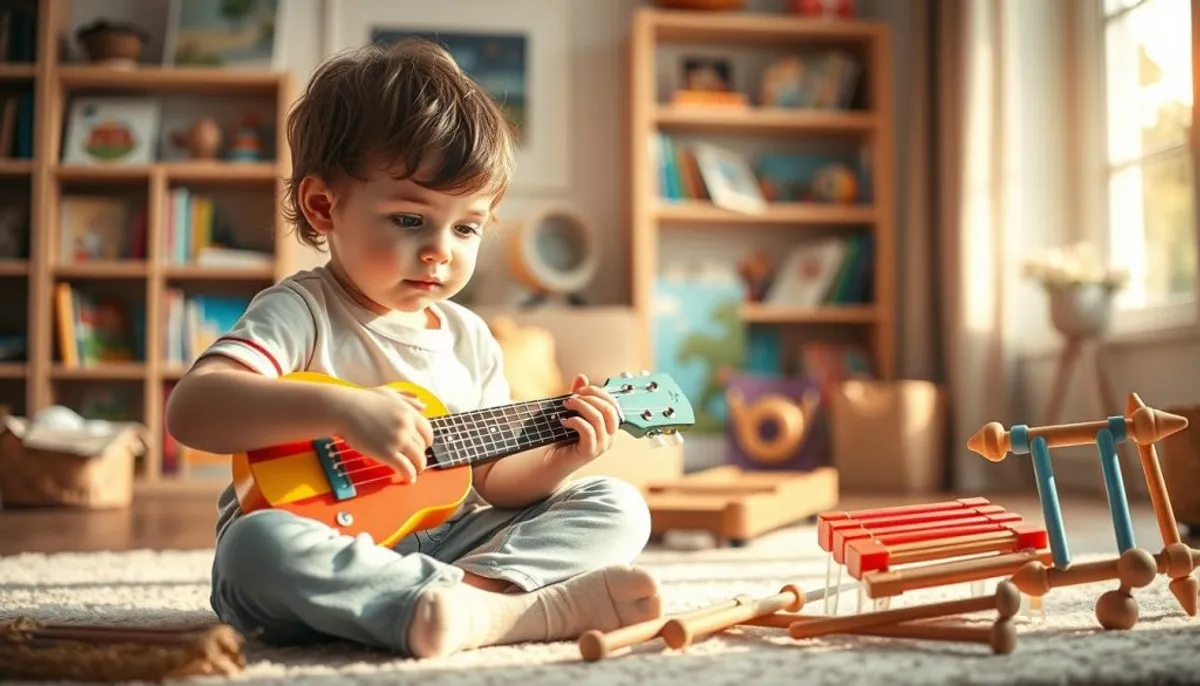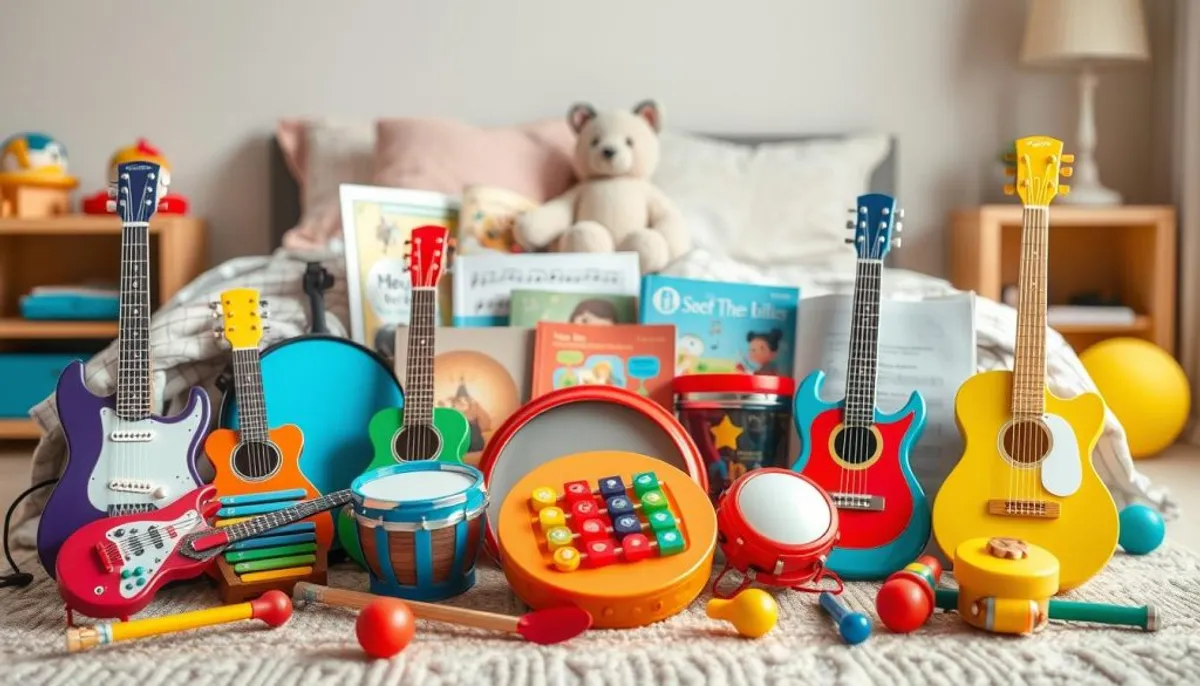Musical awakening is essential for children's development. From birth, their sense of hearing is already operational. This allows for an introduction to music from a very young age. Musical culture in children transcends mere entertainment.
Psychologists agree on one point: parents' enthusiasm for music greatly influences the child. Integrating musical moments into the daily routine, with short and captivating pieces, captures the attention of the young.

The use of accessories, such as small percussion instruments, encourages musical listening. Musical awakening programs, like that of Denisa Kerschova, offer nearly two hours of varied activities. The diversity of instruments, from the harpsichord to the bandoneon, enriches the sound experience.
More than half of parents recognize the benefits of musical experiences on their children's emotional and cognitive development. Introducing music opens up a universe of possibilities, from nursery rhymes to adapted operas, including festivals like Big Bang in Rouen. Finding a cycling good deal can also encourage families to engage in outdoor activities, complementing musical experiences with physical ones.
The importance of musical awakening from a young age
Awareness of music from a young age is essential for the child's development. Research shows that early exposure to music enhances language development and social skills. In children, the information processing capacity is 300,000 times faster than in adults, highlighting the importance of stimulating their brains through playful musical activities.
Sensory development through music
Hearing develops in the embryo as early as 6-7 months. It is advisable to start musical awakening between 0 and 18 months. Music stimulates concentration, language learning, creativity, and motor skills. It also strengthens emotional and social bonds between the child and their surroundings.
The benefits of music on cognitive development
71% of parents believe that early musical education promotes their children's intellectual development. More than 85% of early childhood education professionals state that musical awakening improves self-esteem. Babies exposed to music from a young age demonstrate superior musical skills when learning language.
Recognition of sounds and rhythms in infants
The preschool period is ideal for musical awakening, allowing for the identification of timbres and rhythms. From the age of 3, about 60% of children show interest in playing simple musical instruments. Musical variety stimulates imagination and creativity, fostering cultural openness.
Musical culture for children: fundamentals and approaches
Musical culture in children develops through several avenues. Nursery rhymes and children's songs, exploration of musical instruments, and discovery of various musical styles form the foundations of this artistic awakening.
Traditional nursery rhymes and lullabies
Nursery rhymes and children's songs are essential for language and memory development. They capture young attention with their simple rhythms and repetitive lyrics. In 2017, an interministerial protocol was adopted to encourage the cultural and artistic awakening of young children, highlighting the importance of these oral traditions.
Exploration of musical instruments
Musical instruments for children offer a rich sensory experience. They allow children to discover a variety of sounds and textures. A study reveals that 75% of children improve their ability to perceive complex musical organizations through instrumental exploration.

Discovering different musical styles
Exposing children to various musical genres broadens their cultural horizon, including Hispanic culture. This approach stimulates their creativity and sharpens their auditory sensitivity. Statistics indicate that 81% of students learn to identify relationships between multiple works during their musical education.
| Musical Activity | Percentage of Students Involved |
|---|---|
| Development of listening skills | 100% |
| Expression of emotions and artistic preferences | 60% |
| Improvement of complex musical perception | 75% |
Structured and playful musical learning
Interest in musical learning among children is increasing, thanks to methods that are both structured and entertaining. Playful musical activities create an environment conducive to learning essential skills while providing unmatched enjoyment.
Educational musical games play a central role in this approach. They allow young people to discover rhythm, melody, and harmony interactively. For example, 90% of children find immense pleasure in playing percussion instruments in groups, which stimulates their creativity and coordination.
- 84% of teachers note better student engagement due to the integration of music into the curriculum
- 68% of educators believe that musical activities promote cognitive development
- 72% of children exploring various musical genres demonstrate greater open-mindedness
National initiatives play a key role in this trend. The 40th edition of the Fête de la Musique highlights artistic education for every young person. Additionally, 230 band projects were deployed in France in 2021, benefiting from over 805,000 euros in grants.
Structured and playful musical learning goes beyond the confines of classrooms. The Démos program, targeting children aged 7 to 12 in priority neighborhoods, illustrates the national commitment to making music accessible to all.
| Benefit | Percentage |
|---|---|
| Improvement of social skills | 70% |
| Increase in self-esteem | 40% |
| Strengthening of the sense of belonging | 61% |
Integrating music into family life
Integrating music from a young age transforms the daily lives of families. Daily musical experiences improve children's social skills and emotional regulation by 60%. This practice enriches their personal development, especially during wedding celebrations.
Musical rituals at home
Musical rituals strengthen family bonds. 90% of parents share that involving their children in music reinforces their cultural identity. Each evening, a lullaby or each morning, a song becomes a special moment.

Creating a stimulating musical environment
A rich musical environment stimulates children's development. Exposure to various musical traditions fosters open-mindedness. Children involved in musical activities show a 50% increase in their willingness to engage in collective games.
The importance of parental support in learning
Parental support is essential in musical learning. Mothers involved in musical activities report a 70% increase in their confidence to share their musical heritage. To integrate music into daily life, set aside half an hour at the end of the day to play an instrument, if possible every day.
| Musical Activity | Observed Benefit |
|---|---|
| Family singing | Strengthening of bonds |
| Listening to world music | Cultural openness |
| Daily instrument play | Cognitive development |
Educational and participatory musical activities
Music opens a universe of discoveries for children. Educational and participatory musical activities, such as musical learning, are essential to their development. They stimulate their creativity and enrich their musical culture in a playful way.
Musical awakening workshops
Rhythmic workshops are crucial for children's musical awakening. The Cité de la musique – Philharmonie de Paris offers a range of workshops for everyone, starting from 3 months. These workshops, with over 5200 instruments, provide a rich sensory experience. They promote language development and improve young people's motor skills.
Child-friendly shows and concerts
Musical shows for children last about 45 minutes. They combine traditional nursery rhymes and songs from around the world. Children are encouraged to sing, dance, and interact with musicians. These performances introduce little ones to various musical universes, from West Africa to Polynesia.
Educational musical games
Educational musical games are at the heart of children's musical learning. They allow for an interactive discovery of sounds and rhythms. These playful activities include exploring atypical instruments, stimulating children's curiosity and sensory learning.
| Type of Activity | Age | Benefits |
|---|---|---|
| Rhythmic workshops | 3 months – adult | Language development, motor skills |
| Musical shows | 3 months and older | Cultural discovery, interaction |
| Educational musical games | All ages | Sensory learning, creativity |
Conclusion
Musical culture for children is crucial for their development. It offers multiple benefits, from cognitive improvement to emotional flourishing. Children exposed to music have better memory and concentration. They also learn to solve problems more effectively.
Music has a positive impact on academic performance. It stimulates various areas of the brain, aiding in listening and memorization skills. Practicing an instrument also enhances fine motor skills and coordination, promoting physical development.
Integrating music into family life creates unique moments of sharing. Lullabies and nursery rhymes enrich children's vocabulary, facilitating the learning of reading and writing. Group musical activities develop social skills, such as cooperation and sharing.
In summary, providing a musical culture for children is a gift for their entire lives. This playful and enriching approach fosters harmonious development. It combines creativity, artistic expression, and emotional well-being. Therefore, let us encourage parents and educators to make music a key element in children's lives for a future filled with joyful notes.
RelatedRelated articles


